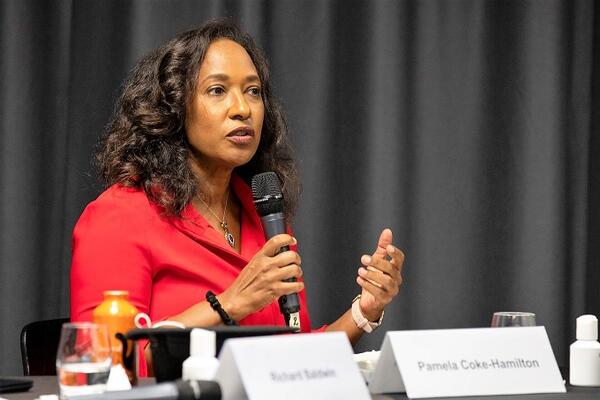
Story: ITC chief addresses pandemic concerns at Geneva trade policy event (en)
The COVID-19 pandemic has radically changed the international trading system, International Trade Centre Executive Director Pamela Coke-Hamilton said on 1 October 2020 at the first Geneva Trade Week.
Ms. Coke-Hamilton spoke in a wide-ranging discussion under the title “Trade and…” moderated by Richard Baldwin, Professor of International Economics at the Graduate Institute, Geneva, which hosted the hybrid onsite-online event.
She said the pandemic’s impact on micro, small and medium-sized enterprises, in particular those run by female and young entrepreneurs, had been profound. However, COVID-19 offered a chance to reset the trading system to be greener and more inclusive.
Ms. Coke-Hamilton was speaking at her first official engagement as ITC Executive Director. Her co-panellists were Marietje Schaake of the Stanford University Cyber Policy Centre, Richard Samans of the International Labour Organization and Anna Stellinger of the Confederation of Swedish Enterprise.
Geneva Trade Week, which ran from 28 September to 2 October, was the first event organized by the Geneva Trade Platform, a new initiative bringing together worldwide trade and development voices.
ITC participated in several sessions, helping put the perspective of micro, small and medium-sized enterprises into the trade policy discussions.
On 30 September, at a session on the role of tech hubs in rebuilding resilient innovation ecosystems, ITC Deputy Executive Director Dorothy Tembo called for public support measures to help tech hubs and digital entrepreneurs to get through the pandemic. She said that post-COVID19 recovery plans must support innovation and invest in existing and future technology.
“Support measures are required in the form of investments, loans and smart capacity building so that entrepreneurs can continue to grow and innovate,” Ms. Tembo said.
Also on 30 September, ITC was actively involved in sessions on the circular economy and post-COVID green recovery, and gastronomy in tourism value chains.
ITC’s expertise on agricultural value chains was crucial in sessions on food security (29 September) and agri-commodity financing (1 October). On 2 October, a session on linking the Sustainable Development Goals with voluntary sustainability standards was the occasion for launching a new ITC-UNCTAD publication on that subject.
Finally, Vanessa Erogbogbo, chief of Sustainable Inclusive Value Chains and head of the SheTrades initiative, represented ITC at the closing plenary on 2 October.
The event encompassed more than 60 sessions across five themes and attracted more than 7,000 online participants in over 90 countries.



